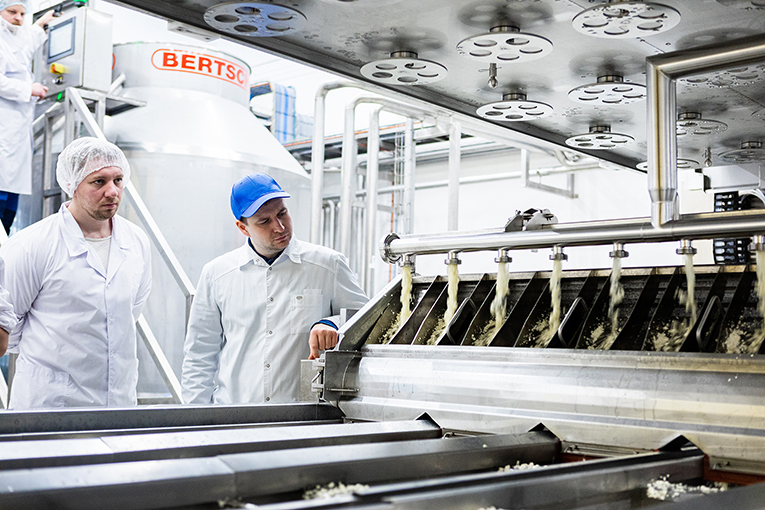A new milestone in cheesemaking
Press-centre / News,
The construction of EkoNiva cheese plant with 60 tonnes of raw milk intake per day is nearing its completion. The first test batch of cheese was made in mid-January.

Once the plant reaches its full production capacity, the daily output will amount to 4 tonnes of semi-hard and 2 tonnes of hard cheeses. Semi-hard cheeses of Dutch and Russian types are made using two major methods. To produce Dutch-type cheese, granular technology is employed – the cheese grains are poured into the moulds together with the whey to minimise exposure to external factors. Non-granular technology applied for the production of Russian-type cheese involves draining a part of whey, thus the cheese moisture content is reduced so the curd gets more porous and forms holes. The first test batches of semi-hard cheese will have matured by the end of March. The production of hard cheeses is also underway.
‘Our hard cheese range is of Bergkaese type with a ripening period of at least 3 months’, notes Aleksey Prostyakov, Manager of Shchuchye cheese plant. ‘We use Brevibacterium Linens, or red mould, which imparts the unique full-bodied flavour to our cheese.’
To date, the volume of cheese produced is limited to two or three test batches of semi-hard and hard cheese types per day. A team of qualified specialists rigorously monitors the entire production process: they carry out cheese maturity tests, set all the required parameters and make adjustments on the go. The batches of cheese are kept in maturing rooms fitted with the climatic system by the French company CLAUGER. At the heart of the facility lies the equipment supplied by Bertsch, one of the leaders in European cheesemaking industry.
‘Bertsch designs and manufactures complete process equipment solutions of the highest quality’, continues Aleksey Prostyakov. ‘The machinery fully meets our production and economic needs. A Bertsch specialist is currently on site training our employees the basics of equipment operation and maintenance.’
The milk used for cheese making comes from Bodeyevka dairy located near the processing plant. Based on the comprehensive quality evaluation comprising 29 indicators, the raw milk from this dairy is best suited for cheese production. One of the key benefits cited by the technologists is that it is high in protein and fat.

‘Our requirements for raw milk quality are even more stringent than those of the State Standard for the highest grade product’, comments Karolina Vasilyeva, Head of Milk Quality Сontrol Department at EkoNiva-APK Holding. ‘Some of the milk quality indicators are our know-how, so we can’t disclose all the secrets. The main parameters for our milk are the following: protein content no lower than 3.5%, casein level above 2.6% and fat content above 3.5%.’
The quality of milk depends on a number of factors, some of them not quite obvious. For example, the cow milking procedure. At EkoNiva facilities, the cows are milked on rotary milking parlours without causing much stress to the animals, which makes EkoNiva milk delectable and full of health benefits.
‘Our milkers have been trained to ensure stress-free milking of the cows’, says Karolina Vasilyeva. ‘We continuously work with the staff to ensure consistently high quality of cheese milk at Bodeyevka dairy.’
In a few months’ time, the cheeses will hit the shelves of major retail chains and EKONIVA brand shops, so all cheese lovers will have the chance to taste the high-quality product made from natural milk.
By Viktor BARGOTIN